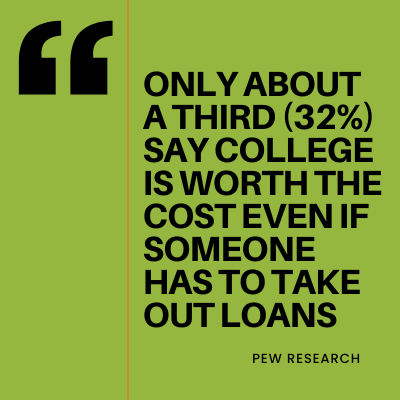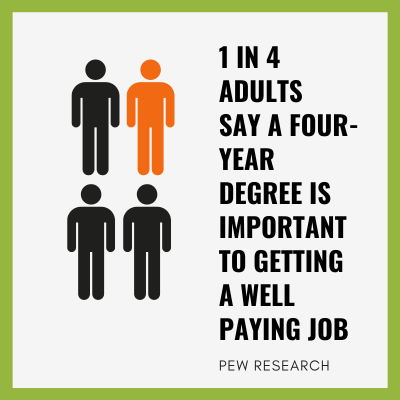Can a National Marketing Campaign Change the Souring Conversation About College?
By Francie Diep and published at Chronicle.com
Higher ed has an image problem.
Everyone is eyeing the same surveys and headlines with gritted teeth: the Gallup and Pew polls showing declining public confidence in colleges and universities, particularly among Republicans. The donors and politicians trying to take a heavier hand with public institutions in Florida, North Carolina, and elsewhere, signs that they no longer trust college leaders to run their own affairs. The enrollment declines that can’t entirely be explained by demographics.
On average, college remains a good investment. Getting a degree helps people stay employed, earn more, and live longer, healthier, happier lives. Would-be students who discount college’s worth may be shortchanging themselves — as well as their country. A less educated America could be less economically competitive and its civic institutions more unstable.
“The biggest national-security problem that no one is talking about is the fact that we’re seeing college-going rates decline tremendously,” Seth Bodnar, president of the University of Montana and an Iraq War veteran and former professor at West Point, said at a panel recently.
In the early 1990s, another industry faced falling interest in its product. Californians were drinking less milk — and had been for 15 years. Consumer research showed people believed milk was healthy, yet they had apparently been enticed away by soda and Snapple.
So California’s biggest dairy processors decided to try something different. They began funding a marketing board, which in 1993 launched a campaign that would eventually go national and gain such cultural cachet that celebrities such as Britney Spears and Whoopi Goldberg would appear in ads. The next year, California milk sales increased for the first time in a decade.
A college degree and a gallon of milk are hardly comparable products. Still, some leaders are entertaining the idea that a unified marketing campaign could help change the souring conversation about college. Should higher ed craft its own answer to “Got Milk?”
The public conversation about college has come to focus on its faults. The average American likes their local institution but has misgivings about “college” in general.
This is a headache for college leaders. For marketers, it may present an opportunity.
“There are myriad situations that call for a brand refresh,” said Melissa F. Richards, who promoted small businesses and technology companies before coming to higher ed more than a decade ago; she’s now Hamilton College’s vice president for marketing and communications. “An important one is when a brand and its audience are misaligned,” she said, “and that’s really relevant right now in higher education.”
Read the full article here.
Or if you are ready to learn how Jobspeaker can help you show value for the tuition students pay, speak with us today!


